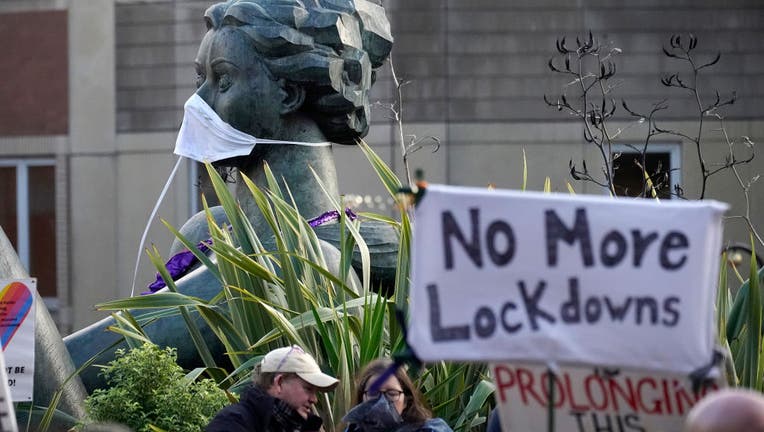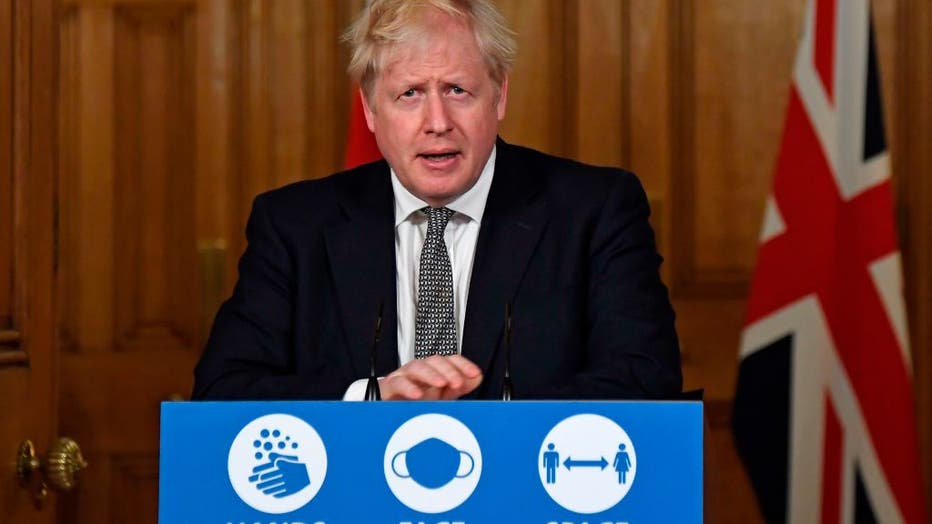England faces monthlong lockdown as COVID-19 cases pass 1 million

FILE - A mask sits on a sculpture named "The River" during a demonstration against a second lockdown in Victoria Square on October 31, 2020 in Birmingham, United Kingdom. (Christopher Furlong/Getty Images)
LONDON - British Prime Minister Boris Johnson on Saturday announced a new month-long lockdown for England after being warned that without tough action a resurgent coronavirus outbreak will overwhelm hospitals in weeks.
On the day the U.K. passed 1 million confirmed COVID-19 cases, Johnson made a sudden about-face and confirmed that stringent restrictions on business and daily life would begin Thursday and last until Dec. 2.
He said at a televised news conference that “no responsible prime minister” could ignore the grim figures.
“Unless we act, we could see deaths in this country running at several thousand a day,” said Johnson, who was hospitalized earlier this year for a serious case of COVID-19.
Under the new restrictions, bars and restaurants can only offer take-out, non-essential shops must close and people will only be able to leave home for a short list of reasons including exercise. Activities ranging from haircuts to foreign holidays must once again be put on hold.

FILE - Britain's Prime Minister Boris Johnson speaks during a virtual press conference on October 31, 2020 to announce new lockdown restrictions in an effort to curb rising infections of the novel coronavirus. (ALBERTO PEZZALI/POOL/AFP via Getty Images)
Unlike during the U.K.’s first three-month lockdown earlier this year, schools, universities, construction sites and manufacturing businesses will stay open.
As in other European countries, virus cases in the U.K. began to climb after lockdown measures were eased in the summer and people began to return to workplaces, schools, universities and social life. The Office for National Statistics estimated Friday that 1 in 100 people in England, well over half a million, had the virus in the week to Oct. 23.
Johnson had hoped a set of regional restrictions introduced earlier in October would be enough to push numbers down. But government scientific advisers predict that on the outbreak’s current trajectory, demand for hospital beds will exceed capacity by the first week of December, even if temporary hospitals set up during the first peak of the virus are reopened.
The scientists warned COVID-19 hospitalizations and deaths could soon surpass the levels seen at the outbreak’s spring peak, when daily deaths topped 1,000. The government's chief scientific adviser, Patrick Vallance, said the mortality rate had “potential to be twice as bad, if not more” than it was during the pandemic's first European wave, if nothing was done.
As European countries such as France, Germany and Belgium in imposing a second lockdown amid surging caseloads, it looked inevitable that Johnson would have to follow.
RELATED: Austria announces 4-week partial lockdown starting Tuesday amid COVID-19 spike
Official figures announced Saturday recorded 21,915 new cases confirmed in the last 24 hours, bringing Britain’s total since the start of the pandemic to 1,011,660. Britain’s death toll from the coronavirus is 46,555, the highest in Europe, with 326 new deaths announced Saturday.
The United States, India, Brazil, Russia, France, Spain, Argentina and Colombia have also recorded more than 1 million cases, according to a tally by Johns Hopkins University. Scientists say the true number of cases is much higher because not everyone with the virus is tested.
Any new lockdown will need Parliament’s approval, and a vote is scheduled for Wednesday. The new restrictions would apply to England. Other parts of the U.K. set their own public health measures, with Wales and Northern Ireland already effectively in lockdown and Scotland under a set of tough regional restrictions.
Scottish First Minister Nicola Sturgeon said Saturday that for now people in Scotland should not travel to or from England, “except for essential purposes.”
Throughout the pandemic, many British scientists and public health experts have accused Johnson of being too slow to act. London School of Hygiene epidemiologist John Edmunds, a member of the government’s scientific advisory group, said that even with the new lockdown, Britain was facing "deaths in tens of thousands from this wave.”
Keir Starmer, leader of the main opposition Labour Party, said in response to the lockdown announcement, "There’s no denying these measures are necessary and I’m glad that the government has finally taken the decision that it should have taken weeks ago.”
But Johnson is under pressure from some members of his Conservative Party, who oppose tighter restrictions because of the economic damage they cause.
Owners of businesses that have struggled to get back on their feet since the first lockdown was eased said the impact of new closures would be devastating.
“People have borrowed up to the hilt and spent money in order to get COVID-secure,” said Kate Nicholls of pub and restaurant industry group Hospitality U.K. “There is no spare capacity in the tank to be able to fund a lockdown, even for three to four weeks.”
A government program that has paid the wages of millions of furloughed employees during the pandemic was due to end Saturday, but will be extended during the new lockdown.
Johnson had planned to announce the lockdown in Parliament on Monday, but was forced into early action after the Times of London reported the news. The government said there would be an investigation into the leak.
RELATED: Taiwan marks 200 days without domestic COVID-19 infection
Johnson said the government had to make “incredibly difficult” judgments during the pandemic. He said it was “a constant struggle and a balance that any government has to make between lives and livelihoods -- and obviously lives must come first.”
England's chief medical officer, Chris Whitty, said at the news conference that “there is basically no perfect time (to act), and there are no good solutions.”
“We’re trying to have the least bad set of solutions,” he said.

